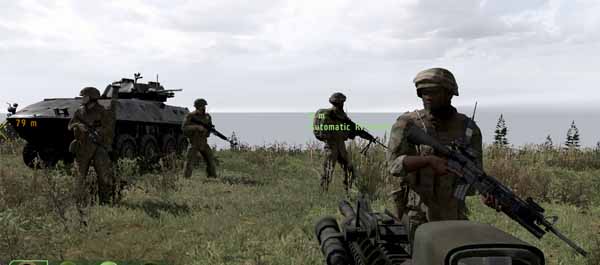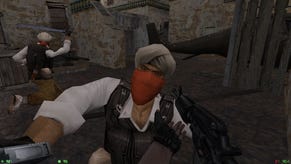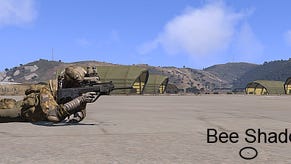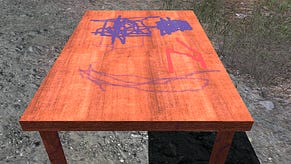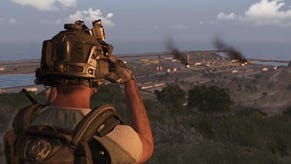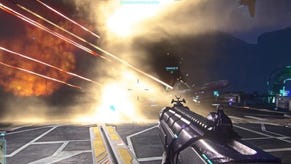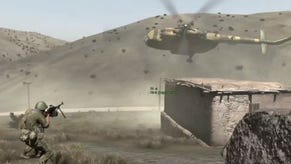Wot I Think: Arma II
Arma II is out in Europe and on Steam. It is the single most ambitious war game ever to grace a games machine. It is full of bugs. Does that mean you shouldn't play it? Here's wot I think.
It seems that many of the games I have the greatest respect for start out as exercises in pure frustration. I had three or four attempts to crack Eve Online, for example. My modest talent for Quake III came out of sheer disgust and rage at the people who, when I first started playing, could shoot me in mid air with a railgun and spam ironic smilies in the text chat at the same time. I'd teach them to :/
Anyway, Arma II seems like one such familiarly frustrating scenario. I was bug-eyed with rage through some of the open levels, where repeated battles with unseen assailants left me, or my team-mates, defeated, and restarting a level, again and again. I was okay with me being rubbish, but what about the three computer-controlled Marines? Why were they allowed to die? I bitched and griped in the RPS chatroom.
Later I watched with sad amazement as my AI helicopter ride refused to land in the open terrain I'd directed it to, instead awkwardly placing itself between some trees to deposit my team. We got out, watched the chopper try to take off, explode, and then spit out the NPC air crew who had just been talking to us. The pilot stood there, unharmed and stupidly glancing about. UNKNOWN, MAN, IN FRONT OF, US, said my AI team mate. I shook my head.
Frustrations with the interface created mess after mess: I'd jump into a helicopter, and order my team to do the same. Except one of them gets into a nearby car. What? Only half way across the vast landscape of Chernarus do I realise that he is following us on the ground. I have to wait for 10 minutes for him to catch up.
There there was the sinking feeling of the sheer arcane complexity of the interface. Going through menu upon menu in the bootcamp training exercises, I wondered if they pay off could possibly be worth the amount of effort was putting in learning how to play. There are half a dozen layers of commands for individual units, and I could potentially be controlling many units at any one time. There wasn't just a hard-as-nails infantry simulation to get to grips with, there was also a strategic-level game, where I'd be not just commanding military forces, but building them from scratch.
It didn't help that the UI is foggy, and unclear, and that the strategic map is incredibly clunky and counter-intuitive: entire at odds with how I'd expect a mouse-driven system work. Rather than click and context menu, the action takes place where I have the mouse when I select an option on the number menu. Eugh. Horrible.
In some ways, it was like being sent back to school. An illogical school, where they teach lessons inside out.
"Welcome to Arma II High, where you're going to have to learn gaming from scratch, starting with the first person shooter, and building up toward the... PAY ATTENTION, ROSSIGNOL!"
Bluuh!
I've still barely got to grips with the commander stuff, and I'm a kind of flailing sadface when playing online, despite having browsed Dslyecxi's dizzyingly large "tactics, techniques & procedures" guide.
And yet I'm now hooked.
The main campaign of Arma II, which unfolds piece by piece, sometimes beautifully, sometimes incoherently, is arguably one of the most interesting gaming experiences on the PC. Running battles through woodlands, interrogating locals, co-ordinating UAV drone strikes, riding mountain bikes, messing about with bombs, helicopters, and stolen Eastern European tractors: the open world military sim begins to cohere, like a formidably layered cake in the Gas Mark 5 oven of your imagination. The sheer variety of what you get up to is enthralling, and it's little more than a sampler of what Arma II as a system, as a wargaming platform, is capable of. Yes, it's messy and ill-judged at times, and recipe is ludicrous, but it is also bold and often brilliant.
The fact that it is total non-linear, and offers multiple paths in a manner than would embarrass most RPGs is one thing, but when you look at the intricacy with which some battles play out - with weather, ordnance, and behaviour all meticulously modelled - it becomes startling.
To get a better idea about that you have to go and have a look at the editor. Drop in and start setting up scenarios: gone are the impossible scripting tasks of the original games, now you can drop events, units, and parameters directly onto the map. With these kinds of shortcuts readily available I expect astonishing scenarios to be conjured up in mere hours. Indeed, we've already seen what people are doing with thousands of AI fighting battles on a single map. A map that covers over two hundred square kilometers of terrain.
Occasionally with a frustrating or difficult game it's a single experience that makes it click, and makes me know why I like it, or why I hate it and must castigate it unto destruction. But not so with Arma II. Instead it was a gradual, sedimentary build up of smaller happenings that vindicated the entire thing. During the campaign this included the introduction of support elements and the escalation of the war, the slow realisation of the enormity of the thing, winning a battle against a much smaller force with just Razor team, seeing my first tank battle, watching attack helicopters in action, seeing the strategic elements build into the game and take advantage of them, delivering an artillery strike correctly, using targeting toys for friendly aircraft, and so on, and on.
While there seems to be something slightly too washed out and shaky about Arma II's engine, it nevertheless bags the feel, the overall sense-data of being in a warzone, better than anything else out there. The crackle and crump of nearby battles seems exactly right, and the sudden confusion and violence of coming under fire is about as harsh as it could be. Struggling towards an injured member of Razor team, dragging him into cover and patching him up: that's a desperate kind of drama that you don't get in many other games.
Mechanically the game is variable. While I hate the UI and almost all of the interface, the feedback of controlling the character is precisely what I want from a game like this - at least once I'd reduced the default headbob a little. Throwing myself to the ground as gunfire kicks off, rolling behind cover, and then crawling for the nearest best point to return fire - it all feels grim and hard. As you play more you realise you can step over low objects - those foe that have foxed gaming protagonists for decades, and even move your gun and head around independently. All this starts to make you realise - as the gun battles slowly become more and more transparent - that sticky-to-wall cover systems in other games might be more fun, but they are as ludicrously artificial as Mario's ability to jump five times his own height. When you're running through woods, or shattered villages, and diving into bushes as bullet zip and snap towards you, the use of cover in Arma 2 feels very real indeed.
Indeed, the sense of adherence to reality, the overall verisimilitude is painfully high, but it's nevertheless consistently broken by all kinds of rough edges and randomness, particular in the behaviour of anything that isn't a human-controlled entity. There's a definite sense that the AI is teetering on the brink of madness, especially when you see tanks flailing about in front of rabbits. For the most part, however, it holds it together. An impressive feat, when you consider quite what it has to deal with. I can't even imagine how you'd begin programming such a monstrosity.
Yet all this is preface, and almost irrelevant to the main engine of long term enjoyment. It takes multiplayer to really explain what the appeal of this game is about. From playing with a friend in the co-op campaign, right through to embarking massive 30-man operations, this is a game where multiplayer is king. I've had just a small taste of this so far, but it instantly banishes any idea that the huge and wide-ranging single player campaign is really a useful focus for any review of the game.
While the options for solo, single player gaming really are vast, it's only when co-ordinating with other players that you really begin to see why this game's predecessors took hold of people's entire lives. Even with the few scenarios that come with Arma II, you're able to play through dozens of hours of war in the Chernarus or island Ubtes theatres, with tank battles flattening entire towns. Many more scenarios are already being produced with that versatile editor.
What's more, once you're hooked up on voice comms you're able to perform far more complex actions that you could hope to do with the AI, as you crudely thumb them around the map. Tactics become real, rather than implied or imagined. Board the helicopter, go in low to avoid anti-aicraft fire, bail out because you're hit, regroup in woodland, hit the target, cripple enemy AA batteries, get picked up, head to the next waypoint - all splurging, organically, into your game. It's enthralling stuff, and only possible because of other people. I wholly recommend the co-op missions over the versus type multiplayer too. Co-ordinating with other people to take on huge AI armies is awesome like little else.
Of course, like plenty of other games I've already sunk lifetimes into - aforementioned Quake III and Eve Online being acute examples - Arma II is a game that rewards practice and organised play. Dropping in to play a random bout of virtual paintball is okay for cheap kicks, but it can be monstrously frustrating. I suspect the real rewards are going to come from playing with practiced groups of players who actually attempt to deliver something approximating soldierly behaviour. That realisation, of course, adds an atmosphere of intimidating inaccessibility for anyone who isn't being introduced to the game by friends. I think that barrier will remain, no matter how good the single player element of the game is. Making the leap beyond mere paddling in the shallows is going to take some gumption. It won't be for most of us. I can see the appeal, now, but I am still hesitant.
Arma II game is already divisive: it was always going to be. It's impossible to examine this game without seeing it as a kind of exemplar of some of the larger issues about what is good and bad about PC gaming: the unfinished code, the performance issues, the difficulty of breaking into established communities - all these things will push people away. But the sheer scope: the raw materials that BIS have forged for gamers to make their own entertainment, their own stories with. I can't say that's a bad thing.
What PC games are is a wide open landscape, and that monstrous, uneven terrain is only getting larger by the day. Thank fuck for this twisted little peninsula of realism, without it gaming would be a whole lot less interesting.
[Want to know about performance issues? The demo thread is here. Go take a look.]







